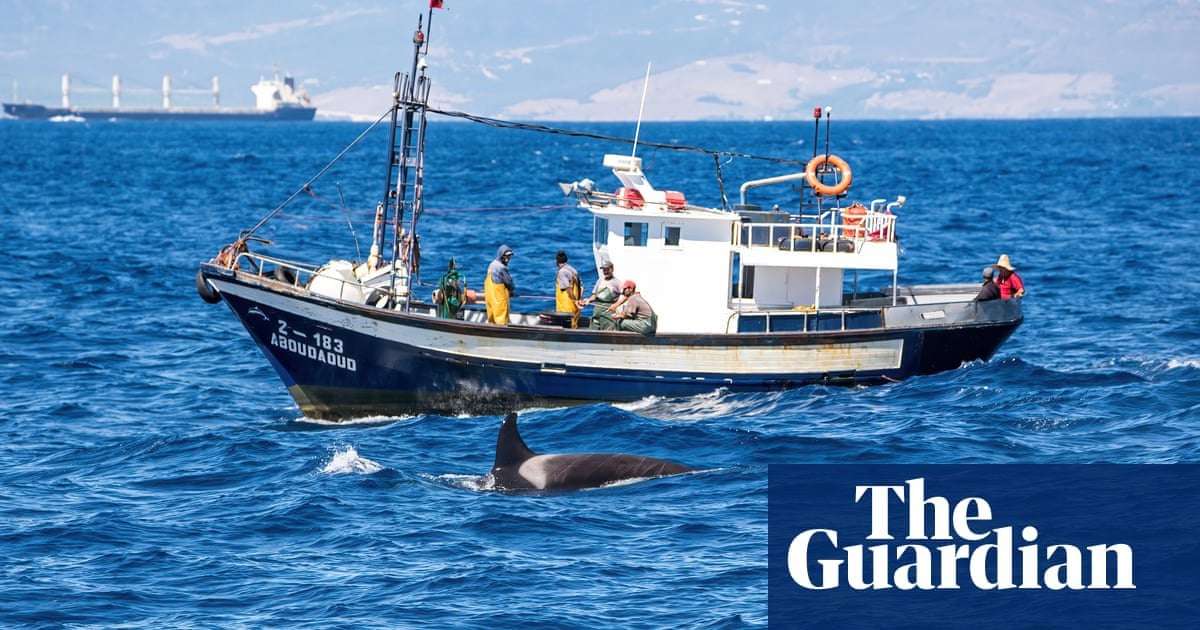An orca repeatedly rammed a yacht in the North Sea off Shetland on Monday, in a concerning development following previous interactions between the cetaceans and vessels in the strait of Gibraltar and Portugal.
Dr Wim Rutten, a 72-year-old retired Dutch physicist and experienced yachtsperson, was sailing solo from Lerwick to Bergen in Norway. He was fishing for mackerel, with a single line off the back of the boat, when the orca suddenly appeared in the clear water, and hit the stern of the seven-ton boat.
“I said: ‘Shit!’” Rutten, who said he had heard about the “Portuguese accidents”, told the Guardian. The whale hit again and again, creating “soft shocks” through the aluminium hull.
“What I felt [was] most frightening was the very loud breathing of the animal,” he said. The orca stayed behind the boat “looking for the keel. Then he disappeared ... but came back at fast speed, twice or thrice ... and circled a bit.
“Maybe he just wanted to play. Or look me in the eyes. Or to get rid of the fishing line.”
This is the same behaviour that has been seen in the Iberian orca population, but it is the first time it has been known to happen in northern waters.
Highly social cetaceans, orcas use complex vocalisations to communicate and to hunt for food, from small fish to blue whales. They learn matrilineally, and post-menopausal females assume the greatest importance in individual pods. “Grandmothers” in the Iberian population of whales have been seen observing during the interactions with yachts and other vessels.
Experts believe this could be play among juvenile whales. Dr Alfredo López, of the Grupo de Trabajo Orca Atlántica in Portugal, said: “We know that many boats use fishing lines from the stern to fish and it is a motivation for orcas, they come to examine them.” But the focus on boats’ rudders may come from adult whales who have developed an aversion towards boats, perhaps because they “had a bad experience and try to stop the boat so as not to repeat it”.
Most surprising is the fact that this learned behaviour should have appeared nearly 3,000 miles (4,800km) from Gibraltar. Dr Conor Ryan, a scientific adviser to the Hebridean Whale and Dolphin Trust, who has studied orca pods off the Scottish coast, said: “I’d be reluctant to say it cannot be learned from [the southern population]. It’s possible that this ‘fad’ is leapfrogging through the various pods/communities.”
skip past newsletter promotion Sign up to Down to Earth Free weekly newsletter The planet's most important stories. Get all the week's environment news - the good, the bad and the essential Privacy Notice: Newsletters may contain info about charities, online ads, and content funded by outside parties. For more information see our Newsletters may contain info about charities, online ads, and content funded by outside parties. For more information see our Privacy Policy . We use Google reCaptcha to protect our website and the Google Privacy Policy and Terms of Service apply. after newsletter promotion
Ryan suggests there may be “highly mobile pods that could transmit this behaviour a long distance”. López thinks, however, “that human activities, even in an indirect way, are at the origin of this behaviour”. Increased marine traffic, dwindling food sources, warming seas and noise pollution could all play a part.
Rutten added: “Maybe the universe knows. We do not.”

3SquirrelsinaCoat on June 21st, 2023 at 14:48 UTC »
What's so cool about this is that these boat attacks are an example of culture, not instinct. This is new behavior that is now spreading, others are learning and they are copying it, for reasons unknown. It doesn't grant them any benefit - no food, no extra safety. That's incredible. I think originally the theory was there were just two orcas attacking in a limited area, off S Africa I think (edit: not S Africa, straight of Gibraltar; S Africa is a different case of weird orca behavior). Now we have the same behavior on the other end of the planet.
Makes you wonder what other cultural things they have going on that we are missing.
cabinetjox on June 21st, 2023 at 14:32 UTC »
The ocean is angry nowadays, jeez
DubbleDiller on June 21st, 2023 at 14:12 UTC »
Liberate us, White Gladis!